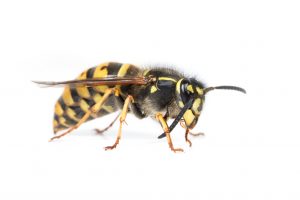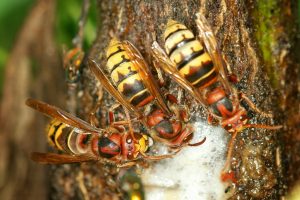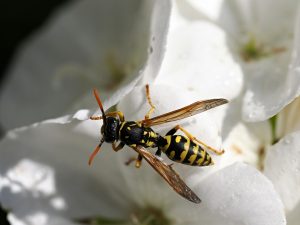Are Wasps Dangerous to Humans?
Wasps are important to the environment, yet they can be dangerous to humans, especially when they nest close to high-traffic areas.
Wasps and hornets are often mistaken for one another, making it challenging to tell them apart. You can better understand their risks by learning the differences between wasps and hornets. Gaining this knowledge – and wasp prevention strategies – can help keep you and your family safe.
What Dangers Do Wasps Pose?
Wasps can be particularly dangerous when their nests are located near homes or frequently visited areas. Wasp nests are often hidden in trees, attics, or other sheltered spaces, making them easy to disturb accidentally.
Wasps can be more aggressive than bees and will often attack to defend their nests. They are most active during the late summer and early fall when their colonies are at their peak, making them more likely to sting when approached.
When wasps attack, they use their stinger to inject venom into their target, and unlike honeybees, they can sting multiple times. Their territorial nature means that wasps can become agitated by loud noises or sudden movements near their nests, making outdoor activities risky if you’re unaware of their presence. Learn how to identify a wasp nest and avoid any risks.
Which Types of Wasps Are Dangerous?
Some species of wasps are more aggressive and pose a greater threat to humans. These include:
 Yellowjackets: These wasps are highly aggressive and will vigorously protect their nests. They are more likely to attack if they feel threatened and can sting multiple times, injecting venom with each sting.
Yellowjackets: These wasps are highly aggressive and will vigorously protect their nests. They are more likely to attack if they feel threatened and can sting multiple times, injecting venom with each sting.
 Hornets: A larger species of wasp, hornets can cause more pain due to the size of their stinger and the potency of their venom. They are highly protective of their nests and will become aggressive if disturbed.
Hornets: A larger species of wasp, hornets can cause more pain due to the size of their stinger and the potency of their venom. They are highly protective of their nests and will become aggressive if disturbed.
 Paper Wasps: While not as aggressive as yellowjackets or hornets, paper wasps will still defend their nests. Their sting is painful, and they can sting multiple times if threatened.
Paper Wasps: While not as aggressive as yellowjackets or hornets, paper wasps will still defend their nests. Their sting is painful, and they can sting multiple times if threatened.
The best way to stay safe is by preventing wasps from infesting your garden or outdoor space. Learn how to prevent wasps.
Dangers of Wasp Stings
A wasp sting can cause immediate pain, swelling, and redness at the sting site. The venom injected by the stinger causes these symptoms and can lead to more severe reactions in certain individuals.
Unlike bees, wasps do not lose their stinger after stinging, so they can sting multiple times during an attack.
Wasp Stings & Allergies
While most stings result in minor irritation, the consequences can be much more severe for individuals allergic to wasp venom. An allergic reaction can lead to symptoms such as swelling beyond the sting site, dizziness, and, in extreme cases, difficulty breathing.
This is known as anaphylaxis, and it requires immediate medical attention.
Wasp Sting Treatment
If you’ve been stung by a wasp – and you’re not experiencing any signs of allergy – act quickly to minimize pain and prevent complications.
For mild to moderate reactions, Healthline recommends washing the sting site with soap and water to reduce the risk of infection. Baking soda or oatmeal baths can also help alleviate redness. Apply a cold compress to ease swelling and pain. Over-the-counter pain relievers or antihistamines can help alleviate discomfort and itching.
It’s crucial to avoid scratching the sting site. This can worsen irritation or introduce bacteria.
If a wasp nest is disturbed, multiple wasps may attack at once, delivering several stings in a short time. The venom from these stings can quickly overwhelm the body, leading to significant pain, swelling, and, in some cases, more severe health complications. Immediate medical attention is required in such cases to prevent life-threatening consequences.
Need Wasp Control?
If you discover a wasp infestation on your property, it’s important not to disturb or attempt to remove the nest yourself. Instead, keep a safe distance and ensure children and pets stay away from the area – and let our trained wasp experts handle the situation, ensuring your safety and peace of mind.
Contact Active Pest Control today for professional and reliable wasp management services. We’ll safely remove or relocate wasp nests.
FAQs
Is it safe to be around wasps?
It’s considered safe to be near wasps as long as you remain calm and avoid disturbing them or their nest.
However, wasps can be provoked to attack if you’re near an active nest. If wasps feel threatened, they can sting repeatedly, which is dangerous, especially for those allergic to their venom. Always exercise caution.
Should I be killing wasps?
No. Killing wasps can provoke them and lead to aggressive attacks. Wasps play an important role in controlling pests and pollinating plants.
If wasps pose a risk, it’s better to contact a professional pest control service to handle their removal safely and without unnecessary harm to the ecosystem.
Will wasps ignore you if you ignore them?
Wasps are less likely to sting if they don’t perceive you as a threat. Avoid sudden movements, swatting, or loud noises, as these can provoke them. While ignoring wasps may reduce aggression, proximity to their nest or actions that disturb them can still trigger defensive behavior.
Proximity to their nest can also make them defensive, even if you don’t directly provoke them. Stay mindful of your surroundings to avoid accidental encounters with territorial wasps.
What should you do if a wasp lands on you?
Stay calm and avoid swatting or making sudden movements. The wasp will likely fly away on its own. Panicking or flailing your arms can provoke the wasp, increasing the risk of being stung.
What makes wasps angry?
Sudden movements, loud noises, vibrations, or anything that threatens their nest can trigger wasp aggression. Swatting at them, disturbing their colony, or getting too close to their hive can also trigger aggression.
Bright colors and strong scents may also attract wasps, potentially leading to defensive behavior.
Are Wasps Dangerous to Humans in Georgia?
Serving Your Pest Needs for Over 35 Years Across Georgia
McDonough | Conyers | Lawrenceville | Alpharetta | Marietta | Columbus
Newnan | Locust Grove | Rome | Atlanta | Brunswick | Byron | Augusta | Savannah
Home » Bee, Wasp, & Hornet Exterminators, Control & Removal » Are Wasps Dangerous to Humans?
